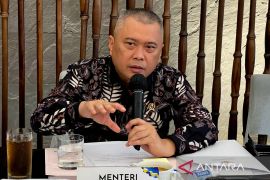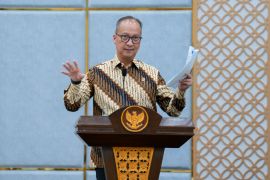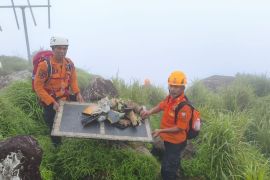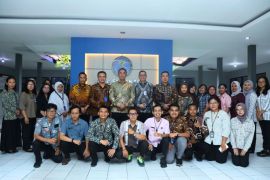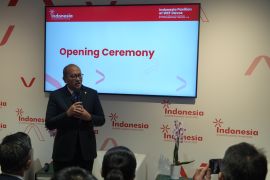The first and most important mission was to seek opportunities and establish cooperation in environmental management beneficial to Indonesia.Jakarta (ANTARA News) - The Indonesian government has sent a large delegation to the United Nations Climate Change Conference being held in Durban, South Africa and charged it with a national and global mission.
The first and most important mission was to seek opportunities and establish cooperation in environmental management beneficial to Indonesia.
And the second one was to help push the conference to come out with a decision on a new protocol to replace he Kyoto Protocol which would expire in 2012.
"It won`t be easy because there are often conflicts of interest," President Susilo Bambang Yudhoyono said when spelling out the delegation`s global mission.
The 17th Conference of Parties (COP 17) to the United Nations Framework Convention on Climate Change (UNFCCC) is being organized in Durban from November 28 to December 9, 2011.
Indonesia`s delegation to the COP 17 is headed by to Executive Chairman of the National Climate Change Council (DNPI) Rachmat Witoelar.
The members of delegation include Environmental Affairs Minister Balthasar Kambuaya, and Chairman of the Presidential Working Unit on Development Supervision and Control (UKP4) Kuntoro Mangkusubroto, and the governor of Central Kalimantan.
AFP reported that 12 heads of government and state and around 130 ministers are to participate in UN climate talks in Durban.
UN climate chief Christiana Figueres said in Durban on Friday (Dec 2) that African leaders from the Central African Republic, Ethiopia, Gabon, the Republic of Congo and Senegal are set to attend the 12-day talks.
Nauru, Honduras, Samoa, Monaco, Fiji, Niue and Norway will also be represented by their heads of state. All but three countries in the 194-nation body have sent representatives.
The key issues on the table are the future of the Kyoto Protocol, the only international treaty limiting greenhouse gases, and whether nations should lay down an objective of crafting a comprehensive climate deal before the end of the decade.
Activating a "green climate fund" that would, by 2020, disburse 100 billion dollars a year to poorer countries is also under discussion.
Yudhoyono in a cabinet meeting on December 2 said he had called the head and members of the Indonesian delegation to the Durban conference and told them what he expected them to achieve.
"I will measure the success of our delegation to South Africa based on these two points," Yudhoyono said.
The head of state also asked the country`s delegation to promote cooperation in forest preservation and to explain Indonesia`s environmental policies.
When receiving Rachmat Witoelar and Minister Balthasar a day earlier (Dec 1), Yudhoyono emphasized the importance of prioritizing the national interests while fighting for global causes in the conference.
Indonesia is part of the global solution, but the national interest must remain a priority, according to Yudhoyono.
The government laid down four objectives for Indonesia`s participation in the conference, according to Rachmat.
The four objectives are the "operationalization" of funding schemes, the establishment of a "Green Climate Fund", acceleration of disbursement of adaptation funds for vulnerable regions, and transfer of technology. Indonesia also keeps on pushing for a global decision on the continuation of the Kyoto Protocol
According to Fitrian Ardiansyah, an environmental observer taking a doctorate decree at Australian National University, the Durban meeting would be considered successful if it can make various important decisions including on the extension of the 2007 Kyoto Protocol.
He further said that the UN conference in general, and the Indonesian delegation in particular, would be seen as successful if they also managed to push for the realization of a commitment from the industrialized countries to provide fast-track financing of the Green Climate Fund of $30 billion from 2010-2012 and $100 billion per year until 2020.
The Durban meeting is expected to launch the Adaptation Committee, make a firmer commitment on establishments of a "green climate fund" and fast-track financing, as well as an agreement on the technical aspects of REDD+ (Reducing Emission from Deforestation and Forest Degradation).
The immediate "operationalization" of the Adaptation Committee envisaged in the Cancun Agreement, would oblige developed nations to help form and implement adaptation policies in vulnerable countries, and ensure that significant climate aid goes to adaptation projects.
"The Indonesian people are waiting whether the Durban Conference will be fruitful or just create more questions," Fitrian said.
Last year, scientists warned that the earth`s temperature rise should be limited to no more than two degrees Celsius above pre-industrial times by the end of the century if devastating climate change is to be avoided.
The Intergovernmental Panel on Climate Change (IPCC) in its 2010 report noted that this can only happen if global greenhouse gas emissions peak by 2015 and rich nations slash their carbon pollution levels by 25 percent - 40 percent from 1990 levels by 2020.
The Indonesian government has pledged to cut gas emissions by 26 percent in 2020 and by 41 percent with international support.
"In the spirit of thinking outside the box, in September this year Indonesia declared an emission reduction target of 26 percent of `business as usual` by 2020, and this can be increased to 41 percent with enhanced international assistance," President Susilo Bambang Yudhoyono said in his speech before participants of the UNFCCC (United Nations Framework Convention on Climate Change), in Copenhagen in December 2009.
The Copenhagen Accord sets a non-binding goal of limiting global warming to below 2 degrees Celsius (3.6 Fahrenheit) above pre-industrial times and a goal of $100 billion in aid from 2020.
It is believed that the outcome of the Copenhagen conference in 2009 fell far short of what is needed to address climate change.
Many parties are now worried that the ongoing Durban negotiations might end up like the Copenhagen conference, which is now seen as having failed to yield any positive results.
WWF, for instance, is also concerned about the potential for a breakdown in negotiations in Durban. WWF expects COP 17 to achieve two main objectives, namely to ensure the operationalization of the Cancun Agreement, and to increase ambition and lay the basis for a future legally binding agreement.(*)
Reporter: By Fardah
Editor: Heru Purwanto
Copyright © ANTARA 2011
